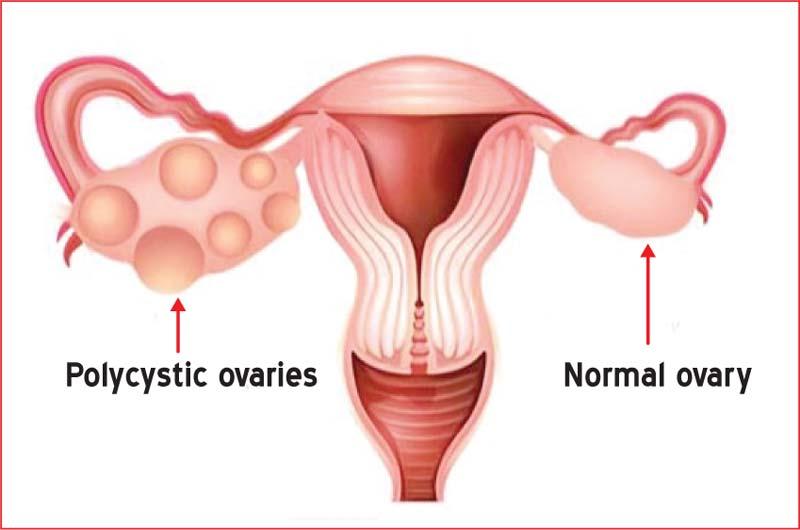17 Dec 2021 - {{hitsCtrl.values.hits}}

| An irregular menstrual cycle is a menstrual cycle that is either more than 35 days or a cycle less than 21 days |
 Irregular periods, acne, excessive hair loss, presence of excess hair on the face, chest and arms darkening of neck and armpits, weight gain- if these symptoms sound samiliar, it might be best to visit a seek medical advice as these are the symptoms presented by those with Polycystic Ovary Syndrome (PCOS). Speaking to The Daily Mirror, Dr. Samanthi Premaratne, Consultant Gynaecologist, stated that PCOS is a metabolic disorder due to a hormonal imbalance resulted by the failure to have a regular ovulation.
Irregular periods, acne, excessive hair loss, presence of excess hair on the face, chest and arms darkening of neck and armpits, weight gain- if these symptoms sound samiliar, it might be best to visit a seek medical advice as these are the symptoms presented by those with Polycystic Ovary Syndrome (PCOS). Speaking to The Daily Mirror, Dr. Samanthi Premaratne, Consultant Gynaecologist, stated that PCOS is a metabolic disorder due to a hormonal imbalance resulted by the failure to have a regular ovulation.
“A regular ovulation is needed for a regular menstrual cycle, so when ovulation is not regular then the menstrual cycle is irregular,” she said, explaining that an irregular menstrual cycle is a menstrual cycle that is either more than 35 days or a cycle less than 21 days. “Usually, many follicles grow in the ovary and then one follicle matures, and the egg is released, that is how ovulation occurs. But, in PCOS, the follicles do not mature and the egg doesn’t get released, thus the woman fails to ovulate. In an ultrasound picture, these immature follicles give a cystic appearance thus this is termed as ‘polycystic ovary syndrome’ however there is no cyst formation,” Dr. Premaratne elaborated.
 Risk factors
Risk factors
She noted that there was an increase in PCOS diagnosis and attributed it to the increased awareness on menstrual cycles and the lifestyle changes in youth. She noted that obesity and being above the normal BMI value was an important risk factor that can result in PCOS. “It is after gaining weight, many start showing symptoms of PCOS.
However, not all who are obese get PCOS but it is a definite risk factor,” she noted. She also shared that there is a genetic disposition to the condition as well, and that if the sister or mother had PCOS, the woman is more likely to get it too.
Key features
Along with irregular cycles, hirsutism (excess hair growth on the face and body), darkening of neck and armpits, acne and excessive hair loss, people with PCOS also have a higher level of androgens (male hormones) and are also insulin resistant.
“Every woman has a certain level of male hormones in their body but those with PCOS have a higher percentage of male hormones which results in hirsutism.
Those with PCOS are likely to also be insulin resistant, and when PCOS is not controlled they are more likely to get diabetes, or even gestational diabetes during pregnancy,” she said adding that those with PCOS are also six times more likely to get endometrial cancer.
She also noted that those with PCOS also tend to have longer periods where they have spotting for weeks or bleed for weeks. “Studies also show that those with PCOS also suffer from various psychosocial issues including body image issues.” she explained.
Controlling PCOS
Dr. Premaratne stated that PCOS is primarily controlled by weight reduction. “Once we diagnose PCOS, we recommend people to make lifestyle changes to lose weight such as exercising regularly. For women beyond adolescence, we do give hormonal medication to regulate the ovulation as not having regular ovulation is unhealthy. It can result in endometrial cancer due to the thickening of the uterine layer. So, to prevent this, hormonal medication is given.” added Dr. Premaratne.
In conclusion, she stated that keeping one’s weight in check and ensuring it was not above the BMI is a method to control PCOS and regulate ovulation.
19 Nov 2024 16 minute ago
19 Nov 2024 2 hours ago
19 Nov 2024 3 hours ago
19 Nov 2024 3 hours ago
19 Nov 2024 3 hours ago